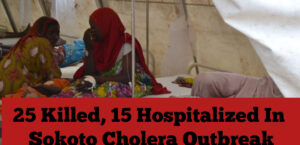
The United Nations has again predicted that 82 million Nigerians, about 64 per cent of the country’s population, may go hungry by 2030, calling on the government to tackle climate change, pest infestations, and other threats to agricultural productivity.
The prediction comes in the wake of a persistent hike in food prices in the country.
According to the National Bureau of Statistics, Nigeria’s food inflation rate hit a record high of 40.66 per cent in May 2024, surpassing the previous month’s 40.53 increase.
This surge represents the largest year-on-year increase in food prices since records began in 1996.
Historically, food inflation in Nigeria has averaged 13.42 per cent, with the lowest point of -17.50 per cent in January 2000.
In 2023, the Food and Agriculture Organisation predicted that no fewer than 2.6 million Nigerians in Borno, Sokoto and Zamfara states, and the FCT may face a food crisis between June and August 2024.
According to a government-led Cadre Harmonisé analysis released in March, 2024, approximately 4.8 million people in Borno, Adamawa and Yobe states are experiencing severe food insecurity, the highest level in seven years.
Also, as Nigerian workers commemorated the 2024 May Day, Organised Labour expressed concern about the country’s rising food prices and fuel scarcity, saying that the current situation threatened the survival of workers.
A Senior Advocate of Nigeria, Olisa Agbakoba, also recently warned that a hunger riot might soon break out in Nigeria, calling on the Federal Government to act fast.
Speaking recently at the launch of CropWatch in Abuja, the Resident Humanitarian Coordinator of the Food and Agriculture Organisation, represented by one of the UN officials, Taofiq Braimoh, said, “The government of Nigeria,in collaboration with others, conducts an annual food security survey. This year’s results are alarming: approximately 22 million Nigerians will face food insecurity in 2023, and around 80-82 million are at risk of severe food insecurity by 2030.
“Nigeria, like many countries, grapples with food insecurity, climate change, unreliable water patterns, pest infestations, and other threats to agricultural productivity. As an agrarian society, our farms’ success directly impacts food availability for our population. Leveraging technology is crucial to strengthening our agriculture sector and ensuring food security.”
He stressed that satellite-based crop monitoring provided real-time data on crop conditions, enabling farmers and policymakers to make informed decisions and optimise agricultural practices.
arming, and get genuine support from the government. Nigeria is facing food insecurity already, so we can’t shy away from what the UN said. It is a pointer to the government’s failure to support agriculture.
“The food industries and our farming system must reach a sustainable level to avert the prediction, and that requires a holistic approach. We need to discard the old farming, storing, and processing systems. Government at all levels must be genuinely committed to promoting agriculture.
“The government must empower farmers and encourage mechanised farming for the youth. The government must also provide soft loans and subsidise farming inplements for genuine farmers.”
Adejare noted that the UN report was correct, adding that the nation must take proactive actions to end food insecurity.
He said, “The UN report is correct. Currently, it will take Nigeria 30 uninterrupted farming and harvesting seasons to achieve food security, because of the shortage we have already.
“The government has not been fair to farmers. The northern farmers are enjoying little benefits from the government, but the South-West governors are not helping the farmers at all. The governors have not been helpful; they have been paying lip service to the promotion of agriculture.”
punchng.com




